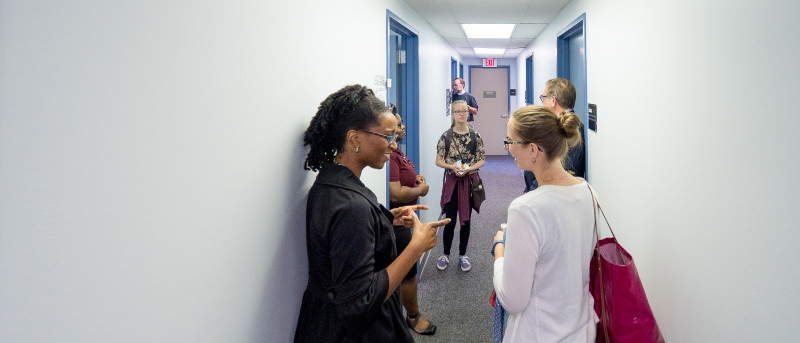Among the improvements that Trinity has been making to its student success offerings is the Center for Experiential Learning and Career Success, which focuses on helping students prepare for the careers they want to pursue, as well as offering them a glimpse into the processes of networking, job application and employer relations. The Center offers new and exciting programs for students who wish to take their job preparation to the next level.
The Center for Experiential Learning and Career Success has two divisions: the Office of Experiential Learning and the Office of Career Services.
“The Office of Career Services still helps students with exploring majors [and] exploring careers. We help them with graduate school preparation, and we work with them on all areas that relate to career.” said Twyla Hough, the director of the office of Career Services.
The Office of Experiential Learning works with students to help them get a feel of what it is like to be in a certain field of work.
“The Office of Experiential Learning will help students engage in what’s called hands-on learning. [“¦] There is no better way to learn than by actually doing something,” said Jacob Tingle, director of the office of Experiential Learning.
This hands on learning allows students to incorporate what they are learning in class with what they need to learn that cannot be taught in a classroom setting.
“What we want to help students do is practice their classroom learning in an environment that is different than the traditional classroom.” said Jacob Tingle, director of the office of Experiential Learning.
Experiential Learning will take place in four big areas, according to Tingle: community service, the undergraduate research that goes on during the summer, internships and course-embedded projects, where students get involved with the community.
According to Hough, both offices work with employers, who decide whether they wish to offer internships or jobs to Trinity students. The Center is developing new programs for students to become better prepared for what they want to do after graduation. The first of these programs is called “˜Alumni in Residence.”
“There will be three Fridays each semester where we will have an alum [“¦], an HR representative from an organization, and that individual will be the one in walk-in hours. So, a student [can] come in and [ask] questions they want to get [answers to] directly from an employer,” said Hough.
According to Annie Cutler, the employer relations and career readiness specialist, these alumni will hail from different fields including technology, business and the sports industry. They will meet with students during walk-in hours and help them with resumes, give interview tips and talk about career opportunities.
The second program is called “˜Tiger Advantage,’ a professionalism certificate program that will allow students to learn different networking skills.
“It is an opportunity to[“¦] [learn] about how to present yourself professionally and in interview settings, learn how to build your LinkedIn profile and promote yourself through social media, networking, the nuances of that; being able to do job shadowing and different things, but having it happen spread across four years,” Hough said.
According to Cutler, Tiger Advantage will give a sort of second curriculum to the one students already have. Students will complete certain tasks over the course of their four years at Trinity and, once they are done, receive a certificate of professionalism, proving that they have acquired skills necessary for networking, self-presentation and job interviews.
“We want to make sure you learn professional development and career-related skills outside of the classroom. [“¦] The point of Tiger Advantage is to structure [“¦] to make sure that when [students are] applying to graduate school, jobs or the Peace Corps, [“¦] they have networking abilities interviewing skills, they know how to put together a resume or cover letter, or write a personal statement for graduate school,” said Cutler
The pilot Tiger Advantage program began on September 10 with 50 faculty-recommended sophomores who were invited to join the pilot. Starting on the Fall of 2016, anyone will be able to participate in the program. It will not be mandatory, but highly recommended for students in every department.
The third program is called “˜Tiger Treks,’ and it a job shadowing program in which students will be able to learn firsthand what it is like to work in a certain field.
“We’re looking to have one for government and non-profits, one for business and one for technology. Students who are planning to go to “˜Making Connections’ can now add another component to that experience where they can, for the morning, go to one of those three sites and shadow and have a panel of professionals at that organization and network with those individuals, and learn more about the different sectors within that particular organization,” Hough said.
The program will take place on January 7 in Houston. The application process will begin in October, so students will apply and complete a short orientation before the beginning of the program. Tiger Treks will be open for students of all ages.
“It’s an exciting time because we’re growing and expanding, and over the course of the next few years there will be lots of neat new offerings of things that we’re doing for students, and with students,” Tingle said.
For more information or to start taking advantage of these on campus services, students can visit the office which is located in Coates University Center, suite 215.







